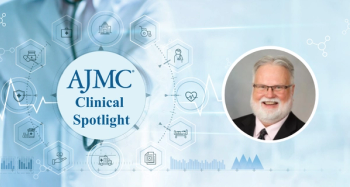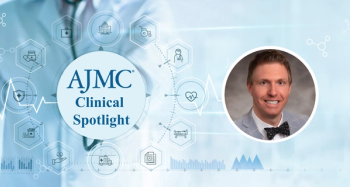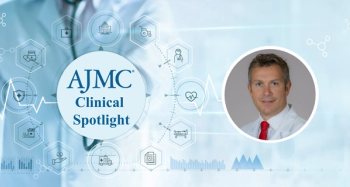
Dr Lucio Gordan Outlines the Treatment Paradigm for KRAS-Positive NSCLC

Being able to treat patients with non–small cell lung cancer (NSCLC) and a KRAS mutation with sotorasib has been exciting, and now there’s another drug available with the approval of adagrasib at the end of 2022, explained Lucio Gordan, MD, of Florida Cancer Specialists & Research Institute.
Being able to treat patients with non–small cell lung cancer (NSCLC) and a KRAS mutation with sotorasib has been exciting, and now there’s another drug available with the approval of adagrasib at the end of 2022, explained Lucio Gordan, MD, chief medical officer for therapeutics and analytics, Florida Cancer Specialists & Research Institute (FCS).
In an interview with The American Journal of Managed Care® (AJMC®), Gordan discussed his experience treating patients with KRAS-positive NSCLC, challenges of treating this patient population, the development of a real-world evidence platform at FCS, and more.
AJMC®: What has been your experience in treating patients with KRAS-positive non–small cell lung cancer in your practice?
Gordan: The experience has been a good one. Of course, we are excited to have a new therapy for a population of patient who has what we used to call an undruggable genotypic profile. Having the ability of using sotorasib for this patient population has been really exciting.
The drug in general—and I'm going to quote not only my experience but experience of other colleagues at Florida Cancer Specialists & Research Institute —has been generally a good one. It's obviously used in second line and beyond for the patients with KRAS mutation. We have seen that the toxicity profile has been manageable and the rate of severe toxicities grade 3 and 4 have been relatively small. We have had a good uptake of sotorasib at Florida Cancer Specialists & Research Institute.
The approval of adagrasib (Krazati) represents a significant addition to the armamentarium to treat patients with KRAS G12C mutation in NSCLC, and hopefully other indications soon. In the pivotal study, KRYSTAL-1, patients with advanced NSCLC had overall response of 43%, median duration of response of 8.5 months, and with an acceptable toxicity profile.”
I am enthusiastic with the recently accelerated pace of progression of treatment options for this patient population.
How large is the patient population? We are a large group. We see about 80,000 new patients a year, and half of those patients have neoplastic process. Non–small cell lung cancer is a common cancer among our patients, and about 20% to 25% of this patient population may have KRAS mutation. The number can be very significant.
AJMC®: Can you talk to us a little bit about the treatment paradigm that you utilize for a patient with metastatic non–small cell lung cancer who might have a KRAS mutation? What's your typical treatment regimen look like?
Gordan: I initially treat these patients with standard therapy, which is chemoimmunotherapy in first line. There are several options one can use. We make sure these patients have their next-generation sequencing [NGS] performed. I’m happy to state that we have an 85% test rate at Florida Cancer Specialists & Research Institute with results on hand at time of treatment, which is important. The presence of a target KRAS G12C [has allowed] us to use the only drug available [previously], which [was] sotorasib, for these patients. That [has been] my to-go drug for second line and beyond for patients with KRAS mutation. [Editor's note: after the initial interview took place, adagrasib was approved by the FDA.]
We also really make a big effort to enroll patients in clinical trials. At our institution, we have 3 direct development units and another 37 sites of late phase clinical trials. We [have tried] to get these patients on other therapies beyond sotorasib if we have a trial available.
AJMC®: Can you tell me what are some of the greatest challenges you face in treating these patients with KRAS-positive non–small cell lung cancer?
Gordan: I think, in general, the drug is well tolerated. It has a duration of response or progression-free survival of about 6 months or so. I would love it to be longer, but it is what it is. At least it is a very reasonable option for these patients with KRAS mutation.
The other challenge may be financial toxicities. The patients may have to pay copays, which can be complicated given the oral space, and the fact is these drugs are not inexpensive. The other challenge, initially, when this drug was approved was to identify the patients who would qualify. But now, I think we have a process in which we are able to get these patients detected and ready for the drug sooner than later. I think maintaining patients on therapy is not necessarily a big challenge as we have significant support from our pharmacy staff and improvement programs to maintain patients on treatment.
AJMC®: How do you expect the treatment of KRAS-positive non–small cell lung cancer to change over time?
Gordan: [At the end of 2022, adagrasib was] approved to compete in this space. It's great to have another option. This drug may have some nuances and may have a different toxicity profile. That [is] an addition in this space.
I think the treatment for KRAS-mutated patients will evolve over time as combination therapies are studied as new KRAS inhibitors become available or are developed. I think we are in the infancy of KRAS treatment in non–small cell lung cancer and other cancers. But we are very excited that we have something to offer to these patients.
AJMC®:Can you tell me what's going on in your world in non–small cell lung cancer that you are excited to share?
Gordan: What I'm personally working on that I'm super excited about is the development of our real-world evidence platform at Florida Cancer Specialists & Research Institute. Our PRECISE technology is our molecular and analytics platform that we have. We are developing quality improvement programs in which we are able to detect patients with driver mutations, and we are able to get targeted therapy for such patients much more quickly than ever before. Meaning we have access to all NGS results of our patients, and we are able to match them with a drug almost on a weekly basis or more often actually. That allows me to identify patients throughout the practice and inform the physician that she or he has a patient that could qualify for a targeted therapy. That's number 1.
Number 2. We are developing quality improvement programs to make sure that these patients are treated and maintain the density and intensity of treatment, that they stay on therapy. That we are managing the side effect profile as properly as we can, and as proactively as we can to ensure that patients get the best response out of the drug.
Number 3, we continue to add more phase 1 clinical trials with this class of drugs and others in the space of non–small cell lung cancer. I'm very excited with the future in clinical research in our institution. Hopefully, we'll continue to bring more options to fruition for this patient population.
The other thing I'm excited about is we developed our own next-generation sequencing laboratories and molecular laboratories at Florida Cancer Specialists & Research Institute. We have a full RNA/DNA perfusion laboratory, and we are able to run specimens in-house, decreasing the turnaround time. We are able to match patients to treatment more quickly than ever. This has been very exciting.
We have our own molecular variant PhDs in-house that are running our molecular tumor board and are able to help the physicians and other providers to connect with the right patient to the right treatment as quickly as possible.
Newsletter
Stay ahead of policy, cost, and value—subscribe to AJMC for expert insights at the intersection of clinical care and health economics.






